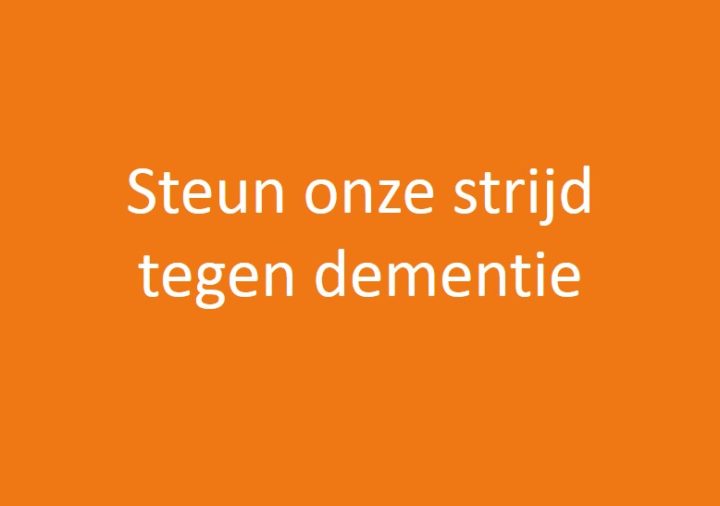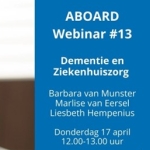Alzheimer Association International Conference 2020
Datum: 23 juli 2020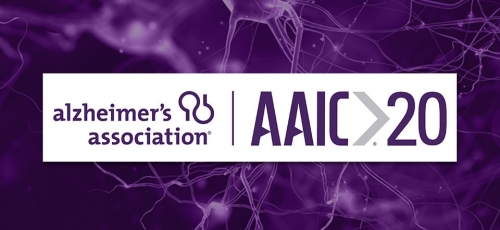
Alzheimer Association International Conference (AAIC), the world’s leading conference on diseases that cause dementia takes place from July 27-31. This year, the conference is virtual with prerecorded and live sessions. You can register for AAIC for free. In this blog we will share conference highlights from Alzheimer Center Amsterdam colleagues and other conference news.
The host city of this years edition is Amsterdam, but because of the covid-19 pandemic the conference can’t take place in real life. We have made a video for all AAIC attendees to give a little taste of Amsterdam and to show them around Alzheimer Center Amsterdam.
Follow news on Alzheimer Center Amsterdam presentations on Twitter.
Friday July 31
The final AAIC presentations of Alzheimer Center Amsterdam researchers you can find here:
The underlying pathology and the genetic risk factors of right temporal variant frontotemporal dementia (FTD) are heterogeneous, unlike semantic dementia. Join the live chat with Hulya Ulugut Erkoyun 8:30AM CDT.
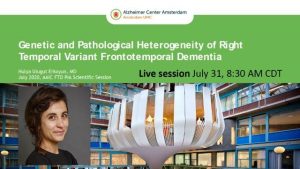 The distinction between behavioral variant frontotemporal dementia (FTD) and psychiatric disorders is difficult due to symptomatic overlap. Marie-Paule van Engelen investigates if computer-assisted techniques can help demonstrate differences by studying metabolism patterns. Live chat 8:30AM CDT.
The distinction between behavioral variant frontotemporal dementia (FTD) and psychiatric disorders is difficult due to symptomatic overlap. Marie-Paule van Engelen investigates if computer-assisted techniques can help demonstrate differences by studying metabolism patterns. Live chat 8:30AM CDT.
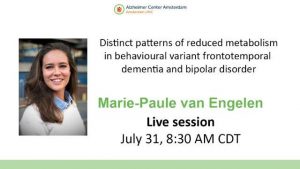 Thursday July 30
Thursday July 30
Self-assessment of everyday functioning is reliable for cross-sectional studies. For longitudinal ageing studies, study partner reports might be more appropriate. Poster #46015 by Merike Verrijp. #CoddeVanBeresteyn #StoffelsHornstra
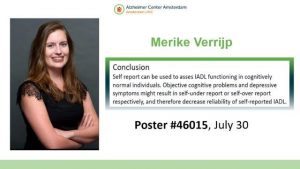 Wednesday July 29
Wednesday July 29
Wednesday July 29 | live sessions
Wiesje van der Flier and Marleen van de Beek present in live sessions today. Make sure to tune in:
Stage 2 Alzheimer’s disease means a diagnosis without cognitive impairment. Wiesje van der Flier shows that a biomarker-based diagnosis is predictive of incident dementia. Live session at 11:30AM CDT. @alzheimernl @Avid @HealthHolland @ZonMw @JPNDeurope #GieskesStrijbis #Pasmanstichting
 Marleen van de Beek shows that patients in early Lewy-Body Dementia stages develop dementia in 3 years. Patients with mild cognitive impairment Lewy-Body Dementia declined faster on attention compared to mild cognitive impairment due to Alzheimer’s disease. Live session at 8:30 AM CDT . @AlzheimerNL @ZonMW @DplanDementie. Read the full paper here.
Marleen van de Beek shows that patients in early Lewy-Body Dementia stages develop dementia in 3 years. Patients with mild cognitive impairment Lewy-Body Dementia declined faster on attention compared to mild cognitive impairment due to Alzheimer’s disease. Live session at 8:30 AM CDT . @AlzheimerNL @ZonMW @DplanDementie. Read the full paper here.
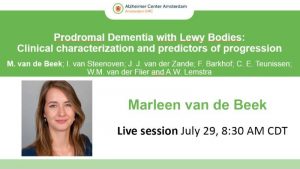 Wednesday July 29 | oral presentations
Wednesday July 29 | oral presentations
Check out these oral presentations by Baayla Boon and Mark Dubbelman on two extremes of clinical manifestations: coarse-grained plaques and everyday functioning.
Coarse-grained plaque, a divergent Aβ-deposit identified in APOE4 early-onset Alzheimer’s disease cases, shows remarkable similarities with capillary CAA, despite its parenchymal localization. Join the live chat with Baayla Boon at 11:30AM CDT @alzheimernl
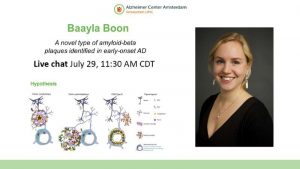 Alzheimer causes problems in everyday functioning. Mark Dubbelman shows that an increase in everyday problems is visible in the earliest years of the disease. Measuring cognition in daily life is important for tracking progression. Live chat: 12:30PM CDT @alzassociation
Alzheimer causes problems in everyday functioning. Mark Dubbelman shows that an increase in everyday problems is visible in the earliest years of the disease. Measuring cognition in daily life is important for tracking progression. Live chat: 12:30PM CDT @alzassociation
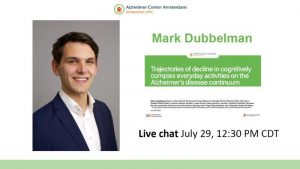 Wednesday July 29 | poster presentations
Wednesday July 29 | poster presentations
Today the presentations are on clinical manifestations. We start the day with posters from Annebet Leeuwis, Hülya Ulugut Erkoyun, Hanneke Rhodius, Marijn Muurling, and Mark Dubbelman. Have a nice day!
Memory problems in heart failure are related with brain atrophy, but not with vascular damage on neuroimaging. Results from the Heart-Brain connection study by Annebet Leeuwis. Check out Poster #42892. #CVON @Hartstichting @dcvalliance
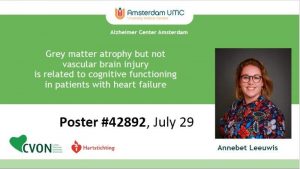 Despite aphasia being the early and defining hallmark of Aphasia Onset Dementia, longitudinal results show that each of these diseases has a characteristic progression pattern that frequently includes non-cognitive symptoms. Poster #42105 by Hülya Ulugut Erkoyun
Despite aphasia being the early and defining hallmark of Aphasia Onset Dementia, longitudinal results show that each of these diseases has a characteristic progression pattern that frequently includes non-cognitive symptoms. Poster #42105 by Hülya Ulugut Erkoyun
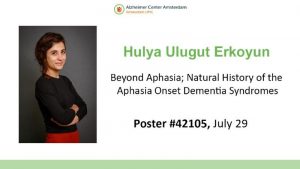 Cognitive tests on the computer can distinguish the types of dementia just as well as “traditional” tests with pen and paper. Useful in times of social distancing! Hanneke Rhodius shows her research results at Poster #42626 @HealthHolland, #Combinostics
Cognitive tests on the computer can distinguish the types of dementia just as well as “traditional” tests with pen and paper. Useful in times of social distancing! Hanneke Rhodius shows her research results at Poster #42626 @HealthHolland, #Combinostics
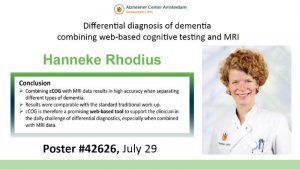 Marijn Muurling found associations of gait disturbances with cognitive impairment and neurodegeneration. Walking patterns can be measured with inexpensive and easy to use accelerometers. More at poster #40152 @HealthHolland @IMI_JU
Marijn Muurling found associations of gait disturbances with cognitive impairment and neurodegeneration. Walking patterns can be measured with inexpensive and easy to use accelerometers. More at poster #40152 @HealthHolland @IMI_JU
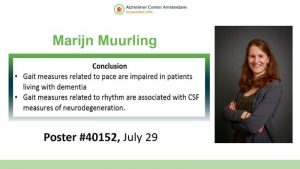 When do changes in functioning have a meaningful impact on daily life according to caregivers? Knowing the smallest meaningful change allows us to better evaluate disease progression and treatment efficacy. Poster #45693 by Mark Dubbelman @alzassociation
When do changes in functioning have a meaningful impact on daily life according to caregivers? Knowing the smallest meaningful change allows us to better evaluate disease progression and treatment efficacy. Poster #45693 by Mark Dubbelman @alzassociation
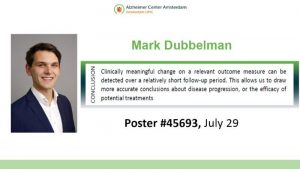 Tuesday July 28
Tuesday July 28
Lies Thijssen, PhD student at Alzheimer Center Amsterdam, was mentioned in a NY Times feature on blood biomarkers. Read it here.
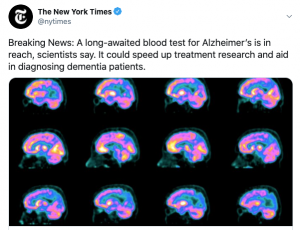 Very proud of prof. Charlotte Teunissen, partner of Alzheimer Center Amsterdam, who is giving a great overview of the work of her and her team on blood biomarkers of Alzheimer’s disease.
Very proud of prof. Charlotte Teunissen, partner of Alzheimer Center Amsterdam, who is giving a great overview of the work of her and her team on blood biomarkers of Alzheimer’s disease.
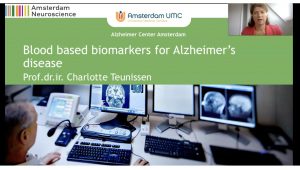 Tuesday July 28 | Oral presentations
Tuesday July 28 | Oral presentations
Today’s oral presentaions. Are you ready for the latest biomarker research from Amsterdam? You can find our researchers here:
Assessing amyloid PET-scans is not as simple as positive/negative. Jarith Ebenau shows that there is a grey in-between area with subtle memory changes. Join the live chat July 28th 7AM CDT. #AVID, #GieskesStrijbisFonds, #Pasman
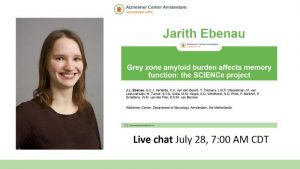 Swift clinical implementation of blood-based biomarkers? Inge Verberk shows results of GBSC standardization of Alzheimer blood biomarker initiative, on pre-analytical sample handling on blood-based amyloid, GFAP and NfL. Join the live chat: 7:30AM CDT @alzassociation
Swift clinical implementation of blood-based biomarkers? Inge Verberk shows results of GBSC standardization of Alzheimer blood biomarker initiative, on pre-analytical sample handling on blood-based amyloid, GFAP and NfL. Join the live chat: 7:30AM CDT @alzassociation
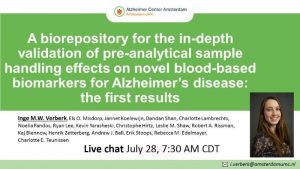 How to implement novel automated tests for cerebrospinal fluid biomarkers in practice? Eline Willemse shows that combinations of biomarkers show the best concordance with amyloid-PET for automated biomarker tests: Elecsys and Lumipulse. Join the live chat at 7:30AM CDT @alzassociation
How to implement novel automated tests for cerebrospinal fluid biomarkers in practice? Eline Willemse shows that combinations of biomarkers show the best concordance with amyloid-PET for automated biomarker tests: Elecsys and Lumipulse. Join the live chat at 7:30AM CDT @alzassociation
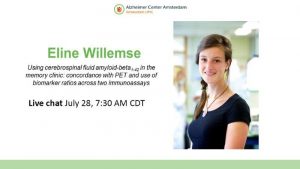 Do patients with the behavioral variant of Alzheimer’s disease (bvAD) show frontal tau pathology? Ellen Singleton shows that bvAD is characterized by a temporoparietal pattern of tau PET, with in some cases involvement of frontal areas. Live chat: 9AM CDT @ZonMw @alzheimernl @AlzheimerEMC
Do patients with the behavioral variant of Alzheimer’s disease (bvAD) show frontal tau pathology? Ellen Singleton shows that bvAD is characterized by a temporoparietal pattern of tau PET, with in some cases involvement of frontal areas. Live chat: 9AM CDT @ZonMw @alzheimernl @AlzheimerEMC
 Does an Alzheimer’s disease hereditary risk profile predict brain damage when dementia is absent? Sven van der Lee shows that a risk profile is more common in people without memory problems, but with Alzheimer biomarkers in cerebrospinal fluid. Join the live chat at 11:00 AM CDT @alzheimernl @ZonMW
Does an Alzheimer’s disease hereditary risk profile predict brain damage when dementia is absent? Sven van der Lee shows that a risk profile is more common in people without memory problems, but with Alzheimer biomarkers in cerebrospinal fluid. Join the live chat at 11:00 AM CDT @alzheimernl @ZonMW
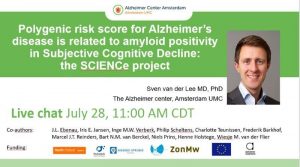 What is the role of amyloid-β aggregation in individuals that maintained cognitive health over the age of 90? Wiesje Pelkmans gives more insight into this topic. Join the live chat at 12:00 PM CDT @IMI_EMIF 90+study.
What is the role of amyloid-β aggregation in individuals that maintained cognitive health over the age of 90? Wiesje Pelkmans gives more insight into this topic. Join the live chat at 12:00 PM CDT @IMI_EMIF 90+study.
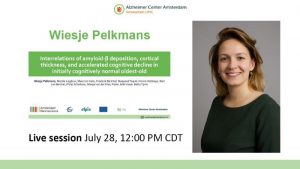 The eye as a ‘Window to the Brain’ in the search for an early, patient friendly biomarker for Alzheimer’s disease. With post-mortem research Frederique Hart de Ruyter shows that phosphorylated tau in the retina can differentiate Alzheimer’s disease from healthy controls. Join the live chat at 12:30PM CDT
The eye as a ‘Window to the Brain’ in the search for an early, patient friendly biomarker for Alzheimer’s disease. With post-mortem research Frederique Hart de Ruyter shows that phosphorylated tau in the retina can differentiate Alzheimer’s disease from healthy controls. Join the live chat at 12:30PM CDT
 It takes ‘two to tangle’. Juhan Reimand shows that amyloid CSF+/PET- status represents a significantly earlier stage of AD than CSF+/PET+. Join the live chat at 2 PM CDT. With Rik Ossenkoppele.
It takes ‘two to tangle’. Juhan Reimand shows that amyloid CSF+/PET- status represents a significantly earlier stage of AD than CSF+/PET+. Join the live chat at 2 PM CDT. With Rik Ossenkoppele.
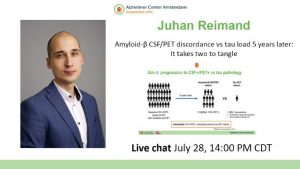 Tuesday July 28 | Live sessions
Tuesday July 28 | Live sessions
Three of our young researchers, Emma Coomans, Lies Thijssen, and Ingrid van Maurik, present their work in a live session today. Go check them out:
In Alzheimer’s disease, tau pathology is associated with loss of synapses and slowing of synaptic activity. Results obtained using state-of-the-art PET and MEG imaging techniques will be presented by Emma Coomans in a live session at 7:00 AM CDT @Rodintx @ZonMw #AvidPharma
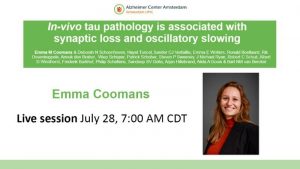 Ingrid van Maurik gives an overview of the biomarker-based prognostic models that have been developed to make a more accurate prognosis in pre-dementia stages. Join the live session at 8:30 AM CDT. @ZonMw @HealthHolland @JPNDeurope #Pasman
Ingrid van Maurik gives an overview of the biomarker-based prognostic models that have been developed to make a more accurate prognosis in pre-dementia stages. Join the live session at 8:30 AM CDT. @ZonMw @HealthHolland @JPNDeurope #Pasman
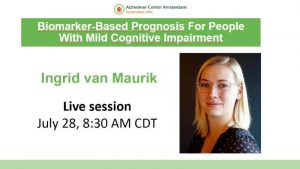 Different biomarkers measured in blood reflect different aspects of Alzheimer’s disease pathology. With these markers we can work towards a minimally invasive way to monitor disease progression and treatment response. Join the live session with Lies Thijssen at 11:30AM CDT @HealthHolland
Different biomarkers measured in blood reflect different aspects of Alzheimer’s disease pathology. With these markers we can work towards a minimally invasive way to monitor disease progression and treatment response. Join the live session with Lies Thijssen at 11:30AM CDT @HealthHolland
 Tuesday July 28 | Featured research session
Tuesday July 28 | Featured research session
From the Heart-Brain connection study Astrid Hooghiemstra organized a session on “Vascular factors of Alzheimer’s disease”. With Geert Jan Biessels, Julie Schneider, Jonathan Schott, Hilde van den Brink, and Christopher Chen. Join the live chat at 6:30AM CDT @Hartstichting @dcvalliance
 Tuesday July 28 | Poster presentations
Tuesday July 28 | Poster presentations
Biomarker day is here. Alzheimer Center Amsterdam researchers are going to be busy today, as many of our research focuses on biomarkers. From cerebrospinal fluid (CSF), PET, to eye research, you can find it today. First up, posters.
When is it useful to perform an amyloid PET-scan? Hanneke Rhodius shows that a computer tool can support physicians with this decision using a stepwise approach. Check it out today at Poster #42687 @HealthHolland #Combinostics
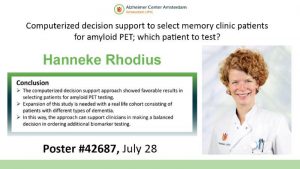 How alike are genetically identical twins in terms of tau? Emma Coomans shows similarities and dissimilarities in tau accumulation in relationship to presence or absence of amyloid-β pathology. Poster #45876 @NTRscience @alzheimernl #AvidRadiopharmaceuticals
How alike are genetically identical twins in terms of tau? Emma Coomans shows similarities and dissimilarities in tau accumulation in relationship to presence or absence of amyloid-β pathology. Poster #45876 @NTRscience @alzheimernl #AvidRadiopharmaceuticals
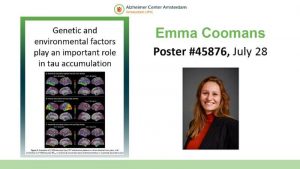 Lisa Vermunt, Brian Gordon & Betty Tijms show in DIAN Alzheimer: Signs of axonal damage measured in cerebrospinal fluid are strongly related to lower structural covariance network integrity. Evidence for a fundamental concept? Poster #45905 @Alzheimernl @BenzingerNeuro1 @WUSTL @MIRNeuro
Lisa Vermunt, Brian Gordon & Betty Tijms show in DIAN Alzheimer: Signs of axonal damage measured in cerebrospinal fluid are strongly related to lower structural covariance network integrity. Evidence for a fundamental concept? Poster #45905 @Alzheimernl @BenzingerNeuro1 @WUSTL @MIRNeuro
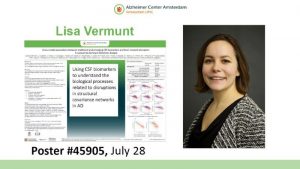 Monday July 27
Monday July 27
AAIC 2020 was just formally opened by dr. Maria Carrillo. She is the chief science officer of the Alzheimer’s Association. Afterwards, prof. Philip Scheltens, as this years scientific program committee chair, had the honor to announce this years lifetime achievement awards.

AAIC live in Alzheimer Center Amsterdam. Everyday some of our researchers come together and watch live sessions to get the conference feel. While keeping appropriate distance of course.

Monday July 27 | Oral presentations
It is time for oral presentations and live chat sessions on basic science and the pathogenesis of Alzheimer’s disease, lewy body dementia, and other diseases that cause dementia. You can find the Alzheimer Center Amsterdam presenters here:
How are immune cells affected by aging and Alzheimer’s disease? Lynn Olst from the department of molecular cell biology and immunology presents CyTOF results on how age-associated blood factors affect peripheral immunity in Alzheimer’s disease. This is a collaboration with Jinte Middeldorp from UMCU BrainCenter. Live chat at 8:30AM CDT. @EU_H2020 @ZonMw @alzheimernl
Biological pathways involved in Alzheimer’s disease risk and resilience: Niccolò Tesi identified immune system and endocytosis pathways associated with resilience against Alzheimer’s disease in cognitively healthy centenarians. Live chat at 11:00AM CDT. @ZonMw @alzheimernl #HorstingstuitFoundation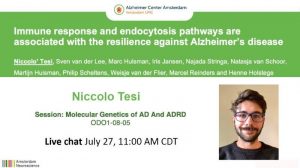
How genetic risk factors contribute to dementia risk remains elusive. Lianne Reus identified genetic risk loci for Alzheimer’s disease and lewy body dementia as protein quantitative trait loci pQTLs SCR1-16-02 @alzassociation. Join the live chat at 11:00AM CDT.
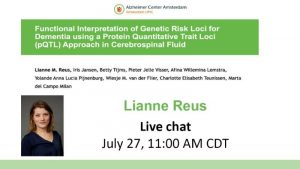 Kirsten Wesenhagen shows that synaptic proteins in cerebrospinal fluid are related with memory depending on amyloid: Lower synaptic levels relate to worse memory in preclinical Alzheimer’s disease, but to better memory in controls. What does this mean? Join the live chat at 12:00 PM CDT @ZonMw
Kirsten Wesenhagen shows that synaptic proteins in cerebrospinal fluid are related with memory depending on amyloid: Lower synaptic levels relate to worse memory in preclinical Alzheimer’s disease, but to better memory in controls. What does this mean? Join the live chat at 12:00 PM CDT @ZonMw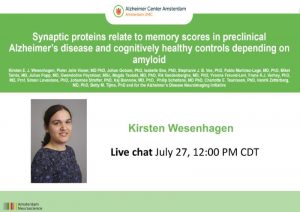
In early stages of Alzheimer’s disease neuronal firing is out of control. In this featured research session Willem de Haan and colleagues will discuss this phenomenon and its clinical relevance for Alzheimer’s disease. Join the live chat at 12:00PM CDT @ZonMw.
Monday July 27 | Poster presentations
We’re so excited AAIC 2020 is here. We’re starting off the week with posters from Alzheimer Center Amsterdam researchers Henne Holstege, Marta Scarioni, and Karlijn van den Bosch on basic science and pathogenesis.
Rare genetic variants in the ATP8B4 gene are associated with a higher risk of Alzheimer’s disease. Results from Henne Holstege after comparing genetic material from 26,000 patients with Alzheimer’s disease and controls. Poster #41592 #Dioraphte @alzheimernl #HorstingStuit
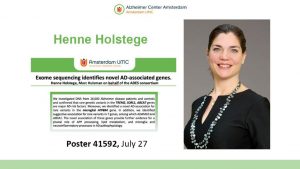 And another poster on genetics by Henne Holstege and her team. They found that loss of function variants in the SORL1 gene occurred almost exclusively in patients with Alzheimer’s disease. Poster #44492 #Dioraphte @alzheimernl #HorstingStuit
And another poster on genetics by Henne Holstege and her team. They found that loss of function variants in the SORL1 gene occurred almost exclusively in patients with Alzheimer’s disease. Poster #44492 #Dioraphte @alzheimernl #HorstingStuit
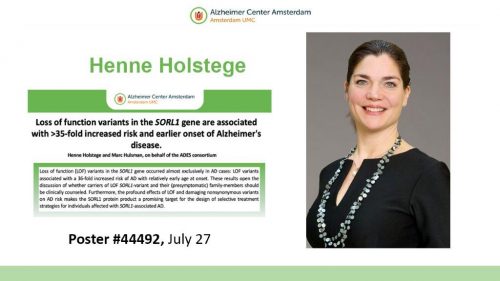
Karlijn van den Bosch shows that in individuals with subjective cognitive decline (SCD) and amyloid pathology, the BDNF Met-allele is a risk factor for faster cognitive decline and dementia. Poster #42728 @ZonMw @alzheimernl #GieskesStrijbisFonds @JPNDeurope
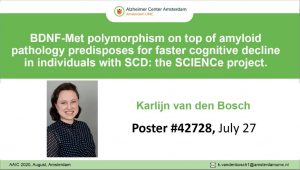
Psychiatric symptoms are common in frontotemporal dementia (FTD) and form an indicator of underlying pathology. Marta Scarioni shows that early presence of acoustic hallucinations points to TDP43 pathology. Check it out at poster #38926 #EANeurology. Read the paper here.
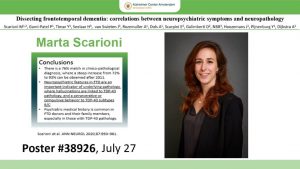
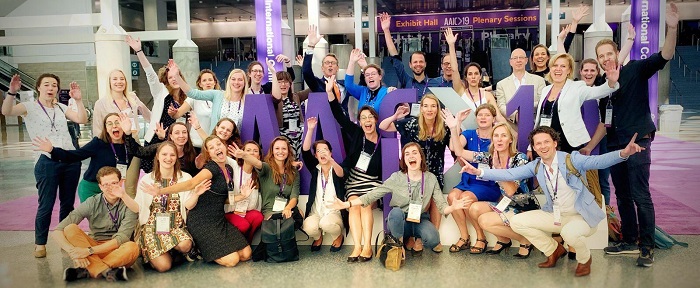
Alzheimer Center Amsterdam on AAIC 2019 in Los Angeles
